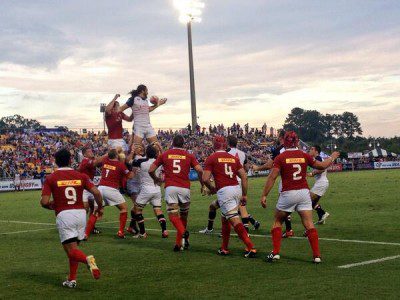 BOSTON, MASSACHUSETTS – It’s undeniable that American rugby is in a better place now than it was ten years ago. The game continues to grow at the grassroots level, becoming the fastest growing team sport in the country, according to an oft-cited 2010 survey. Professionally, there are more Americans playing in top international leagues than ever before, with the likes of Samu Manoa, Scott Lavalla, and Chris Wyles successfully plying their trade in Europe. However, the growing stature and respect gained by American rugby players abroad has not translated into improved results from the national team this summer, American College Rugby is no different.
BOSTON, MASSACHUSETTS – It’s undeniable that American rugby is in a better place now than it was ten years ago. The game continues to grow at the grassroots level, becoming the fastest growing team sport in the country, according to an oft-cited 2010 survey. Professionally, there are more Americans playing in top international leagues than ever before, with the likes of Samu Manoa, Scott Lavalla, and Chris Wyles successfully plying their trade in Europe. However, the growing stature and respect gained by American rugby players abroad has not translated into improved results from the national team this summer, American College Rugby is no different.
RWU’s Junoir Blaber recapped the miserable summer endured by the Men’s National Team. Find it here, here, and here. The comments section in the aftermath of the mauling suffered against Canada, this past weekend demonstrates that there is a desire among the American rugby community to not only point out the issues faced by the side, but generate a long-term action plan attacking institutional issues that will put the States on a path to Tier 1 status.
As a current college player, I have experienced firsthand many of the issues faced by emerging American rugby players. The lack of institutional and financial support is draining, especially when students are faced with the academic commitments required by college study. Additionally, the befuddling playoff structure faced by large, Division 1 teams seems downright straightforward when compared to the byzantine conference system that dominates at the small college level.
As a foreigner, you would assume that rugby is covered by the NCAA as they manage college sports in the US. However, rugby enjoys varsity status at only a few institutions. Therefore, there is not necessarily a scouting program in place for most college level rugby squads. On a practical level, the reality is that many players pick up the sport for the first time in college. Some of these players demonstrate a natural inclination for the game, either through innate talent or through their prior acquisition of translatable skills, whether their past background was on the football field, soccer pitch, or through playing another sport.
This means that potential national team talent is being missed due to the underexposure of lower division rugby. Though the number of international quality players plying their trade at small colleges is undoubtedly small, with the lack of depth that the United States faces, every effort should be made to ensure that no player is left on the sidelines simply because nobody “higher up” has had the chance to see him or her play. Yet this is exactly the situation faced by many promising student-athletes that do not compete at the California’s and the BYU’s of the college rugby world.
USA Rugby needs to work much more closely with colleges to ensure that rugby becomes a varsity sport and students gain access to scholarship opportunities that will allow them to pursue rugby with the same dedication and security afforded athletes that play more “traditional” sports. Recently there is a trend where small non-NCAA but rather NAIA schools are moving to varsity programs Life University was the first but has been followed by Davenport, Linwood, Wheeling Jesuit and American International College. Major Colleges with varsity programs remain outliers. USA Rugby needs to establish a transparent system that ensures talent is both identified and respected. As a sport, rugby has more respect from the American athletic community than at any time in recent history. When asked, many school authorities will admit that the demands of the game meet or exceed the standards placed upon other, “certified” varsity sports. The first achievable step to accomplishing the goal of making American rugby into a world power is guaranteeing our pipeline of talent. Therefore, as the community moves into the first Olympic cycle, and the next World Cup cycle, one of the foremost priorities must be improving the situation of our college athletes and making the next step, to professionalization and the national team, an achievable dream for all worthy players.
Thank you and feel free to comment below, look for and “Like” our FacebookRugby Wrap Up Page and follow us on Twitter @RugbyWrapUp, @JunoirBlaber,@Declan Yeats, @ckuxmann and @Ebstide52, respectively.

